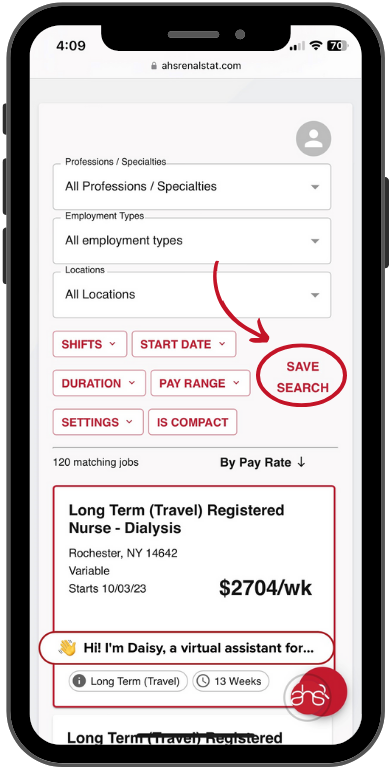Traveling for dialysis jobs opens up a world of possibilities. You can explore new places, embrace different cultures, and gain valuable experience, all while continuing to provide essential care to patients. But we understand that the idea of venturing out alone can feel daunting.
We want to empower you to travel with confidence. This post is packed with practical tips and advice specifically tailored for dialysis professionals traveling solo for work assignments. We’ll cover everything from pre-trip planning and packing essentials to staying safe during your journey and handling unexpected situations. With the right preparation and knowledge, you can focus on what truly matters – enjoying your travel experience and making a difference in the lives of others.
At AHS RenalStat, we’re committed to supporting you every step of the way. We offer comprehensive resources and personalized guidance to help make sure that you feel safe and comfortable during your travel assignments. See our available travel dialysis jobs here to get started.
Pre-Travel Planning to Start Prepared
It’s essential to be well-prepared before you hit the road so you won’t be caught off guard by unexpected complications.
- Partner with a Trusted Agency: When you’re considering travel dialysis assignments, choose a reputable staffing agency like AHS RenalStat. A trusted agency should prioritize your safety and well-being, ensuring you have the necessary support and resources throughout your assignment. They can assist with credentialing, licensing requirements, and securing safe and comfortable housing options.
- Prioritize Safe Accommodations: When choosing your temporary housing, prioritize safety and convenience. Opt for secure accommodations ideally located near the dialysis center. This will minimize your commute time and reduce the risk of encountering unfamiliar or potentially unsafe areas, especially during late-night or early-morning shifts.
- Transportation Planning: Research safe and reliable transportation options for your daily commute to the dialysis center. Depending on the location, you might consider public transportation, ride-sharing services, or renting a car. If you choose to drive, identify a well-lit, secure area close to work to find your daily parking spot.
Packing for Safety and Comfort
Whether you’re heading across the state or across the country, having the right essentials can make all the difference in your experience.
- Prioritize Medications: If possible, pack enough medication to last the entire duration of your assignment, plus a buffer in case of unexpected delays. It’s also wise to carry a copy of your prescriptions and treatment plan, in case you need refills or encounter any issues with your supplies.
- Medical Documentation is Key: Always carry copies of your medical insurance cards, identification, and any relevant medical records. Having this information readily available can be crucial in case of emergencies or if you need to seek medical attention while on assignment.
- Personal Safety Items: Packing a few personal safety items in your daily work bag can provide peace of mind. Consider including a personal alarm, a backup charging pack for your phone, and a basic first-aid kit.
- Financial Preparedness: Make sure you have enough cash and a secure credit or debit card to cover your expenses while on assignment. It’s always wise to have backup payment options in case of emergencies.
Staying Safe During Travel Dialysis Jobs

When you’re working a dialysis travel assignment, follow these practical tips to help you stay safe and secure while you’re on the road.
- Share Your Work Schedule and Check In Regularly: Before you leave for your assignment, share your travel itinerary and work schedule with a trusted friend or family member. Let them know where you’ll be staying and how to reach you. Make a habit of checking in with them regularly to let them know you’re safe and sound. This simple step can provide peace of mind for both you and your loved ones.
- Be Mindful of Your Surroundings: Whether you’re walking to work, exploring a new city, or simply running errands, always be aware of your surroundings. Avoid poorly lit or isolated areas, especially at night.
- Trust Your Gut Instincts: If something feels off or uncomfortable, don’t ignore it. Whether it’s a person, place, or situation, it’s always better to err on the side of caution. If you’re feeling uneasy, leave the area or find a safe space where you can assess the situation and seek help if needed.
- Familiarize Yourself with Your New Work Area: On your first day at the new facility, take the time to familiarize yourself with the layout, emergency exits, and safety procedures. Knowing where everything is and how to respond in case of an emergency can help you feel more confident and prepared.
- Socialize Safely: If you’re interested in meeting new people and socializing during your assignment, do so with caution. Be mindful of who you share personal information with, and avoid oversharing details about your work, living situation, or financial status. It’s also wise to meet new people in public places and let someone know where you’re going and who you’ll be with.
Dealing with Emergencies on Your Dialysis Travel Assignment
While we hope your travel assignment goes smoothly, it’s always wise to be prepared for unexpected situations.
- Have a Plan: Once you know where you’ll be living while on assignment, identify the location of the nearest urgent care center and pharmacy. Save their phone numbers in your phone, as well as the number for the local police number to call in case of non-emergency situations like a car accident or vehicle break-in..
- Prepare for Lost or Stolen Items: Keep copies of important documents, such as your passport, driver’s license, and insurance cards, in a secure location separate from the originals.
- Stay Calm and Take Action: In any emergency, the most important thing is to remain calm and focused. Take a deep breath, assess the situation, and take appropriate action based on your pre-trip planning and research. Remember, you’re not alone.
Supporting You During Travel Dialysis Jobs – AHS RenalStat
By prioritizing safety and following the tips in this guide, you can confidently explore new places, provide essential care to patients, and enrich your career. With the right mindset and resources, you can make the most of your travel experiences while maintaining your well-being. At AHS RenalStat, we’re here to support you on your journey. Let us help you turn your travel dialysis dreams into reality. Contact us today to learn more about our current travel dialysis job openings.

